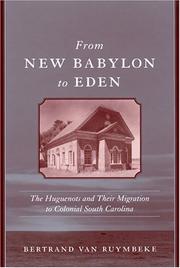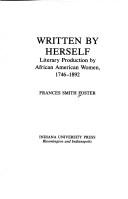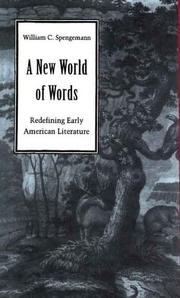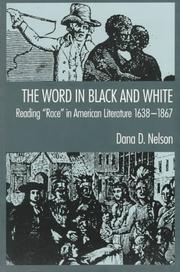| Listing 1 - 5 of 5 |
Sort by
|
Book
ISBN: 9781851969487 9781851969494 Year: 2010 Publisher: London ; Brookfield, Vermont Pickering and Chatto
Abstract | Keywords | Export | Availability | Bookmark
 Loading...
Loading...Choose an application
- Reference Manager
- EndNote
- RefWorks (Direct export to RefWorks)
This eight-volume reset edition traces the evolution of imperial and colonial ideologies during the British colonization of America. It covers the period from the founding of the Jamestown colony in Virginia in 1607 to the end of the American Revolutionary War in 1783. At the start of the seventeenth century, colonies were largely autonomous private enterprises. Over time, however, British governments grew more interventionist as they became increasingly alarmed by the colonists' economic and political liberties. The works cover a wide range of ideas on empire and colonies from both sides of the Atlantic. Varied and often incompatible imperial and colonial ideas were espoused by British political economists, politicians, administrators, colonial governors and other officials, as well as by colonists. Sources include pamphlets, reports, sermons and letters. Almost all the texts are reproduced in full. The edition benefits from a general introduction, introductions to Parts I & II, headnotes, endnotes and a consolidated index in the final volume. The editorial material takes into account recent intellectual, theoretical and methodological approaches pioneered in empire studies. This edition will be important for scholars of Atlantic History, American and British History and Empire Studies.
United States --- Great Britain --- History --- Colonies --- États-Unis --- Grande-Bretagne --- 1600-1775 (Période coloniale) --- 1775-1783 (Révolution) --- Amérique --- Sources --- Colonies britanniques

ISBN: 1570035830 9781570035838 Year: 2006 Publisher: Columbia University of South Carolina Press
Abstract | Keywords | Export | Availability | Bookmark
 Loading...
Loading...Choose an application
- Reference Manager
- EndNote
- RefWorks (Direct export to RefWorks)
"Winner of the National Huguenot Society's 2007 Book of the Year award, From New Babylon to Eden traces the persecution of Huguenots in France and the eventual immigration of a small bloc of the French Calvinist population to proprietary South Carolina. Once there, rather than isolate themselves as a separate religious and cultural enclave, they chose instead to integrate into the Southern strain of nascent Anglo-American society. Through intermarriage and adaptation to the new economic, religious, and political environment, Huguenots soon numbered among the most influential and successful colonists and have left a persevering legacy throughout Charleston and the lowcountry. In a volume devoted to the first generation of Carolina Huguenots, Bertrand Van Ruymbeke describes in detail their gradual transformation from French refugees to South Carolina planters.Van Ruymbeke recounts the escalating persecution that led to the Huguenot exodus from France and tells how approximately five hundred émigrés settled in South Carolina. He credits their decision to relocate to the vigorous marketing efforts of the Lords Proprietors, the owners and rulers of the province, who promised the French Calvinists a veritable Eden. The Huguenots quickly discovered the colony was not paradise, but they adapted to the new environment by abandoning their Old World silk, olive oil, and wine trades for the more lucrative pursuits of Indian trade, cattle ranching, and rice planting.Placing the Carolina migration in the context of the larger Huguenot diaspora, Van Ruymbeke proffers an account that challenges accepted history. Describing their settlement as a process of acculturation and creolization rather than simply assimilation, he contends that the majority of these French Calvinists sought to create their own churches but were thwarted by an Anglicized elite eager to dominate Anglo-Carolinian society. He also reveals that most members of the initial generation were moderately—not exceptionally—prosperous and that it was their descendants who acquired the wealth often associated with lowcountry Huguenots. Van Ruymbeke concludes with an epilogue describing the Huguenot legacy in South Carolina."--
Huguenots --- Huguenots in France --- Christian sects --- Protestants --- Migrations&delete& --- History --- South Carolina --- South Carolina (Colony) --- South Carolina (Province) --- I︠U︡zhnai︠a︡ Karolina --- Ethnic relations. --- Religious life and customs. --- Migrations --- Protestants français --- Caroline du Sud (États-Unis) --- États-Unis --- À l'étranger --- 1600-1775 (Période coloniale) --- Émigration et immigration

ISBN: 025320786X 9780253207869 0253324092 Year: 1993 Volume: *2 Publisher: Bloomington Indianapolis Indiana University Press
Abstract | Keywords | Export | Availability | Bookmark
 Loading...
Loading...Choose an application
- Reference Manager
- EndNote
- RefWorks (Direct export to RefWorks)
African American women in literature --- African Americans in literature --- Afro-Americans in literature --- Afro-Amerikaanse vrouwen in de literatuur --- Afro-Amerikanen in de literatuur --- Afro-Américains dans la littérature --- Amerikaanse zwarten in de literatuur --- Black Americans in literature --- Femmes afro-américaines dans la littérature --- Negroes in literature --- Noirs américains dans la littérature --- Zwarte Amerikanen in de literatuur --- African American women --- American literature --- Women and literature --- Afro-American women in literature --- Literature --- English literature --- Agrarians (Group of writers) --- Afro-American women --- Women, African American --- Women, Negro --- Women --- Intellectual life --- African American authors&delete& --- History and criticism --- Women authors&delete& --- African American authors --- Colonial period, ca. 1600-1775 --- Women authors --- 19th century --- Harper, Frances Ellen Watkins --- Wheatley, Phillis --- Albert, Octavia Victoria Rogers --- Keckley, Elizabeth --- Lee, Jarena --- Prince, Lucy Terry --- LITTERATURE AMERICAINE --- FEMMES NOIRES AMERICAINES --- FEMMES NOIRES AMERICAINES DANS LA LITTERATURE --- NOIRS AMERICAINS DANS LA LITTERATURE --- AUTEURS NOIRS --- HISTOIRE ET CRITIQUE --- 1600-1775 (PERIODE COLONIALE) --- FEMMES ECRIVAINS --- 19E SIECLE --- VIE INTELLECTUELLE

ISBN: 0300057946 9780300057942 Year: 1994 Publisher: New Haven London Yale University Press
Abstract | Keywords | Export | Availability | Bookmark
 Loading...
Loading...Choose an application
- Reference Manager
- EndNote
- RefWorks (Direct export to RefWorks)
Early American literature has traditionally been defined as writings in English by residents of the land that later became the United States. Thanks to this definition, it has only a modest reputation: "early" has come to mean "less"--Less American and less literary than American literature proper. In this book, the author redefines early American literature, calling it writings in English that reflect or have been influenced by the discovery, exploration, and settlement of the New World. The book discusses that linguistic criteria should have precedence over national origin in determining the national literature to which a given work rightfully belongs, and from this perspective he examines a variety of works in new and provocative ways. He analyzes Milton's Paradise Lost as an American poem that reflects the impact of the discovery and settlement of America on seventeenth-century religious culture; traces the semantic development of the English word Columbus from its first written appearance in 1553 to its identification with the United States after 1780; and compares in detail Benjamin Franklin's autobiography, William Blake's "The Marriage of Heaven and Hell," and Jane Austen's Northanger Abbey, viewing them as comparable - and American - writings, all concerned with comprehending the displacement of the remembered Old World by an altogether new one.
Canon (Literature) --- Canon (Literatuur) --- Canons littéraires --- Literaire canon --- American literature --- History and criticism --- Theory, etc. --- Franklin, Benjamin, --- Milton, John, --- Smith, John, --- Columbus, Christopher --- Criticism and interpretation. --- In literature. --- United States --- Intellectual life --- Colonial period, ca. 1600-1775 --- Franklin, Benjamin --- Criticism and interpretation --- Milton, John --- Smith, John --- Classics, Literary --- Literary canon --- Literary classics --- Best books --- Criticism --- Literature --- English literature --- Agrarians (Group of writers) --- History and criticism&delete& --- Theory, etc --- Colombo, Cristoforo --- Colomb, Christophe --- Columbus, Christoffel --- Colombus, Christophorus --- Colón, Cristóbal --- Kolumbus, Christoph --- Rubinstein, Anton, --- Franklin, Venīamin, --- Franklin, V. --- Firānklīn, Binzhāmīn, --- Fu-lan-kʻo-lin, --- Fu-lan-kʻo-lin, Mu-chieh-ming, --- Franklin, Ben, --- Franklin, --- Franklin, B. --- Franklin, Beniamino, --- Tradesman of Philadelphia, --- Pirāṅḷin̲, Peñcamin̲, --- Франклин, Бенджамин, --- Franklin, Bendzhamin, --- פראנקלין, בנימין --- פראנקלין, בנימין, --- فرانكلين، بنجامين، --- فرانكلين، بنيامين --- فرانكلين، بنڇامين --- 富兰克林, --- Saunders, Richard, --- ABŞ --- ABSh --- Ameerika Ühendriigid --- America (Republic) --- Amerika Birlăshmish Shtatlary --- Amerika Birlăşmi Ştatları --- Amerika Birlăşmiş Ştatları --- Amerika ka Kelenyalen Jamanaw --- Amerika Qūrama Shtattary --- Amerika Qŭshma Shtatlari --- Amerika Qushma Shtattary --- Amerika (Republic) --- Amerikai Egyesült Államok --- Amerikanʹ Veĭtʹsėndi︠a︡vks Shtattnė --- Amerikări Pĕrleshu̇llĕ Shtatsem --- Amerikas Forenede Stater --- Amerikayi Miatsʻyal Nahangner --- Ameriketako Estatu Batuak --- Amirika Carékat --- AQSh --- Ar. ha-B. --- Arhab --- Artsot ha-Berit --- Artzois Ha'bris --- Bí-kok --- Ē.P.A. --- EE.UU. --- Egyesült Államok --- ĒPA --- Estados Unidos --- Estados Unidos da América do Norte --- Estados Unidos de América --- Estaos Xuníos --- Estaos Xuníos d'América --- Estatos Unitos --- Estatos Unitos d'America --- Estats Units d'Amèrica --- Ètats-Unis d'Amèrica --- États-Unis d'Amérique --- Fareyniḳṭe Shṭaṭn --- Feriene Steaten --- Feriene Steaten fan Amearika --- Forente stater --- FS --- Hēnomenai Politeiai Amerikēs --- Hēnōmenes Politeies tēs Amerikēs --- Hiwsisayin Amerikayi Miatsʻeal Tērutʻiwnkʻ --- Istadus Unidus --- Jungtinės Amerikos valstybės --- Mei guo --- Mei-kuo --- Meiguo --- Mî-koet --- Miatsʻyal Nahangner --- Miguk --- Na Stàitean Aonaichte --- NSA --- S.U.A. --- SAD --- Saharat ʻAmērikā --- SASht --- Severo-Amerikanskie Shtaty --- Severo-Amerikanskie Soedinennye Shtaty --- Si︠e︡vero-Amerikanskīe Soedinennye Shtaty --- Sjedinjene Američke Države --- Soedinennye Shtaty Ameriki --- Soedinennye Shtaty Severnoĭ Ameriki --- Soedinennye Shtaty Si︠e︡vernoĭ Ameriki --- Spojené staty americké --- SShA --- Stadoù-Unanet Amerika --- Stáit Aontaithe Mheiriceá --- Stany Zjednoczone --- Stati Uniti --- Stati Uniti d'America --- Stâts Unîts --- Stâts Unîts di Americhe --- Steatyn Unnaneysit --- Steatyn Unnaneysit America --- SUA (Stati Uniti d'America) --- Sŭedineni amerikanski shtati --- Sŭedinenite shtati --- Tetã peteĩ reko Amérikagua --- U.S. --- U.S.A. --- United States of America --- Unol Daleithiau --- Unol Daleithiau America --- Unuiĝintaj Ŝtatoj de Ameriko --- US --- USA --- Usono --- Vaeinigte Staatn --- Vaeinigte Staatn vo Amerika --- Vereinigte Staaten --- Vereinigte Staaten von Amerika --- Verenigde State van Amerika --- Verenigde Staten --- VS --- VSA --- Wááshindoon Bikéyah Ałhidadiidzooígíí --- Wilāyāt al-Muttaḥidah --- Wilāyāt al-Muttaḥidah al-Amirīkīyah --- Wilāyāt al-Muttaḥidah al-Amrīkīyah --- Yhdysvallat --- Yunaeted Stet --- Yunaeted Stet blong Amerika --- ZDA --- Združene države Amerike --- Zʹi︠e︡dnani Derz︠h︡avy Ameryky --- Zjadnośone staty Ameriki --- Zluchanyi︠a︡ Shtaty Ameryki --- Zlucheni Derz︠h︡avy --- ZSA --- Η.Π.Α. --- Ηνωμένες Πολιτείες της Αμερικής --- Америка (Republic) --- Американь Вейтьсэндявкс Штаттнэ --- Америкӑри Пӗрлешӳллӗ Штатсем --- САЩ --- Съединените щати --- Злучаныя Штаты Амерыкі --- ولايات المتحدة --- ولايات المتّحدة الأمريكيّة --- ولايات المتحدة الامريكية --- 미국 --- Spojené obce severoamerické --- États-Unis --- É.-U. --- ÉU --- Littérature américaine --- 1600-1775 (période coloniale) --- Histoire et critique --- Littérature américaine --- 1600-1775 (période coloniale)

ISBN: 0195089278 0195065921 0195362144 1280525282 1429407328 9781429407328 9780195065923 0197726933 Year: 1992 Publisher: New York Oxford Oxford University Press
Abstract | Keywords | Export | Availability | Bookmark
 Loading...
Loading...Choose an application
- Reference Manager
- EndNote
- RefWorks (Direct export to RefWorks)
This study aims to describe the ways in which white American authors constructed ""race"" in their work from the time of the first colonists up to the period of the Civil War. The book focuses on a number of texts that deal with the relations among Indians, blacks and whites.
American literature --- Thematology --- anno 1600-1699 --- anno 1800-1899 --- anno 1700-1799 --- Colonial period, ca. 1600-1775 --- History and criticism --- White authors --- 19th century --- 1783-1850 --- Minorities in literature --- Race in literature --- Bird, Robert Montgomery --- Criticism and interpretation --- Child, Lydia Maria Francis --- Jacobs, Harriet Ann --- Minorities in literature. --- Race in literature. --- Minorities as a theme in literature --- English literature --- Agrarians (Group of writers) --- History and criticism. --- United States --- Intellectual life --- ABŞ --- ABSh --- Ameerika Ühendriigid --- America (Republic) --- Amerika Birlăshmish Shtatlary --- Amerika Birlăşmi Ştatları --- Amerika Birlăşmiş Ştatları --- Amerika ka Kelenyalen Jamanaw --- Amerika Qūrama Shtattary --- Amerika Qŭshma Shtatlari --- Amerika Qushma Shtattary --- Amerika (Republic) --- Amerikai Egyesült Államok --- Amerikanʹ Veĭtʹsėndi︠a︡vks Shtattnė --- Amerikări Pĕrleshu̇llĕ Shtatsem --- Amerikas Forenede Stater --- Amerikayi Miatsʻyal Nahangner --- Ameriketako Estatu Batuak --- Amirika Carékat --- AQSh --- Ar. ha-B. --- Arhab --- Artsot ha-Berit --- Artzois Ha'bris --- Bí-kok --- Ē.P.A. --- EE.UU. --- Egyesült Államok --- ĒPA --- Estados Unidos --- Estados Unidos da América do Norte --- Estados Unidos de América --- Estaos Xuníos --- Estaos Xuníos d'América --- Estatos Unitos --- Estatos Unitos d'America --- Estats Units d'Amèrica --- Ètats-Unis d'Amèrica --- États-Unis d'Amérique --- Fareyniḳṭe Shṭaṭn --- Feriene Steaten --- Feriene Steaten fan Amearika --- Forente stater --- FS --- Hēnomenai Politeiai Amerikēs --- Hēnōmenes Politeies tēs Amerikēs --- Hiwsisayin Amerikayi Miatsʻeal Tērutʻiwnkʻ --- Istadus Unidus --- Jungtinės Amerikos valstybės --- Mei guo --- Mei-kuo --- Meiguo --- Mî-koet --- Miatsʻyal Nahangner --- Miguk --- Na Stàitean Aonaichte --- NSA --- S.U.A. --- SAD --- Saharat ʻAmērikā --- SASht --- Severo-Amerikanskie Shtaty --- Severo-Amerikanskie Soedinennye Shtaty --- Si︠e︡vero-Amerikanskīe Soedinennye Shtaty --- Sjedinjene Američke Države --- Soedinennye Shtaty Ameriki --- Soedinennye Shtaty Severnoĭ Ameriki --- Soedinennye Shtaty Si︠e︡vernoĭ Ameriki --- Spojené obce severoamerické --- Spojené staty americké --- SShA --- Stadoù-Unanet Amerika --- Stáit Aontaithe Mheiriceá --- Stany Zjednoczone --- Stati Uniti --- Stati Uniti d'America --- Stâts Unîts --- Stâts Unîts di Americhe --- Steatyn Unnaneysit --- Steatyn Unnaneysit America --- SUA (Stati Uniti d'America) --- Sŭedineni amerikanski shtati --- Sŭedinenite shtati --- Tetã peteĩ reko Amérikagua --- U.S. --- U.S.A. --- United States of America --- Unol Daleithiau --- Unol Daleithiau America --- Unuiĝintaj Ŝtatoj de Ameriko --- US --- USA --- Usono --- Vaeinigte Staatn --- Vaeinigte Staatn vo Amerika --- Vereinigte Staaten --- Vereinigte Staaten von Amerika --- Verenigde State van Amerika --- Verenigde Staten --- VS --- VSA --- Wááshindoon Bikéyah Ałhidadiidzooígíí --- Wilāyāt al-Muttaḥidah --- Wilāyāt al-Muttaḥidah al-Amirīkīyah --- Wilāyāt al-Muttaḥidah al-Amrīkīyah --- Yhdysvallat --- Yunaeted Stet --- Yunaeted Stet blong Amerika --- ZDA --- Združene države Amerike --- Zʹi︠e︡dnani Derz︠h︡avy Ameryky --- Zjadnośone staty Ameriki --- Zluchanyi︠a︡ Shtaty Ameryki --- Zlucheni Derz︠h︡avy --- ZSA --- Η.Π.Α. --- Ηνωμένες Πολιτείες της Αμερικής --- Америка (Republic) --- Американь Вейтьсэндявкс Штаттнэ --- Америкӑри Пӗрлешӳллӗ Штатсем --- САЩ --- Съединените щати --- Злучаныя Штаты Амерыкі --- ولايات المتحدة --- ولايات المتّحدة الأمريكيّة --- ولايات المتحدة الامريكية --- 미국 --- États-Unis --- É.-U. --- ÉU --- LITTERATURE AMERICAINE --- MINORITES DANS LA LITTERATURE --- RACE DANS LA LITTERATURE --- 1600-1775 (PERIODE COLONIALE) --- HISTOIRE ET CRITIQUE --- AUTEURS BLANCS --- 19E SIECLE
| Listing 1 - 5 of 5 |
Sort by
|

 Search
Search Feedback
Feedback About UniCat
About UniCat  Help
Help News
News